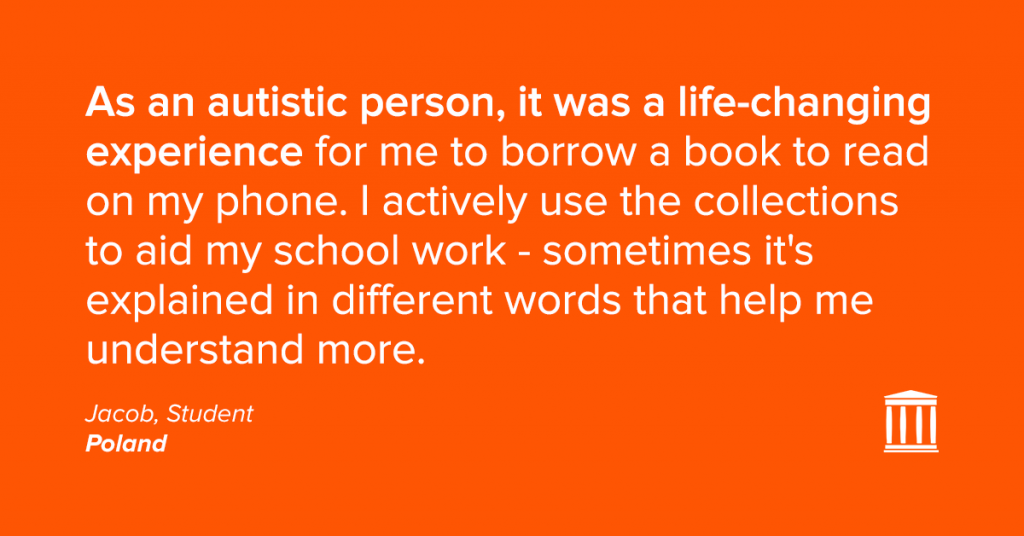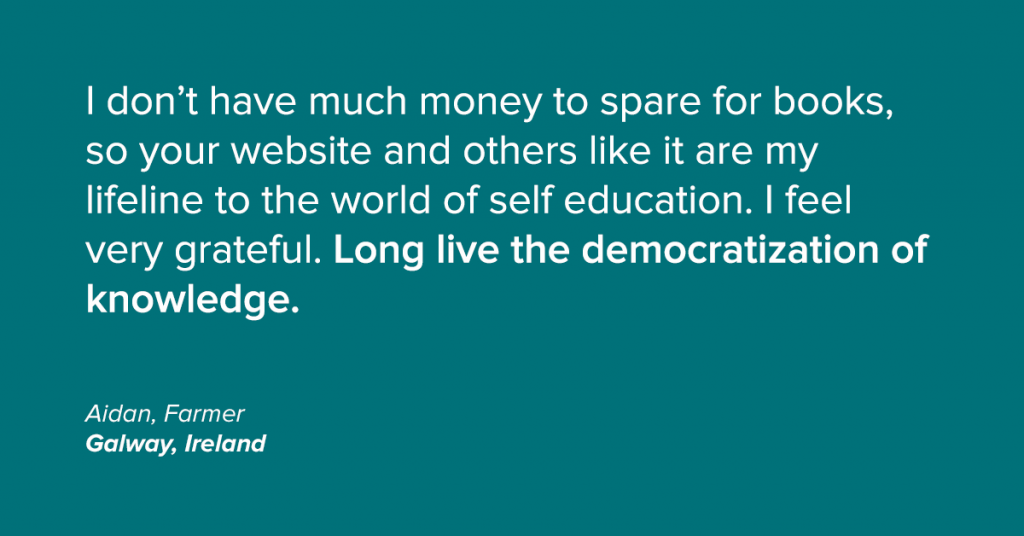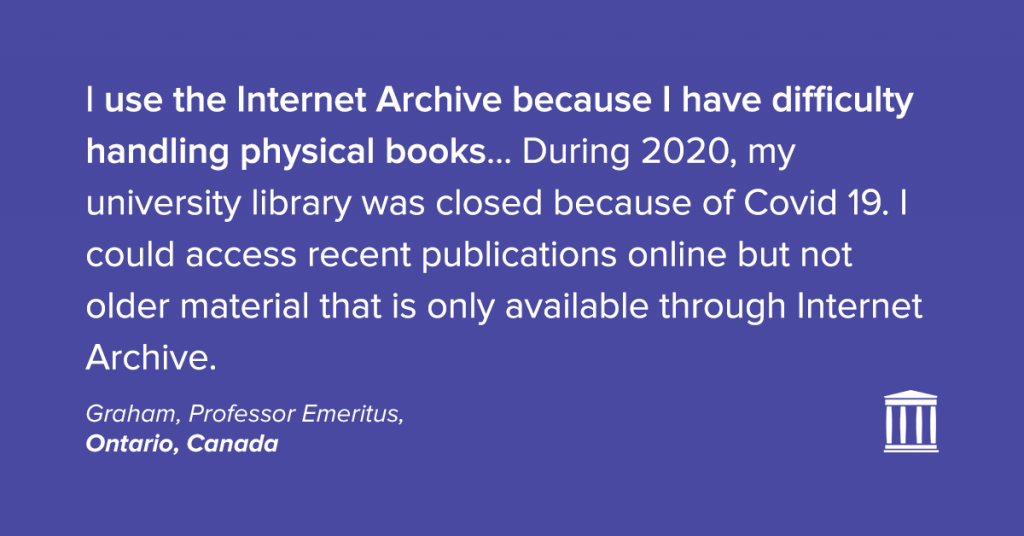Last fall, we invited our patrons to share how you use the Internet Archive. The response was overwhelming, and gave us exactly the kinds of testimonials and messages of support we were hoping to gather.
As we worked through the responses, we were struck by the number of patrons from all over the world who use our collection. Here now, we’d like to share some of the powerful stories we received from our international users.
If you haven’t already done so, please share your story.
Editorial note: Statements have been edited for clarity.
Lisa M., Educator, England – “Internet Archive helped me help a student! I have students in one class that attend from around the globe. One student was unable to find the required texts and our university did not have digital copies that could be lent. If she were to order the book – not carried in any local stores – it could take up to 3 months for them to arrive, long after the course was over!”
Claudia G., Researcher, Romania – “Even before the pandemic, depending on the topic of my essay and thesis, it was difficult to find books on certain topics in local libraries or bookstores…Access to knowledge shouldn’t be for the rich and privileged.”
Ana S., Communications assistant, Brazil – “I borrowed a book about Stephen Sondheim. Sondheim’s story and body of work is definitely an inspiration for me as someone always trying to learn ways to exercise my creativity. I just wanted to browse one section, and it was really amazing. I’m really thankful you had it available, for anyone in the world, and the borrowing process was really easy to follow through.”

Mike D., Librarian, New Zealand – “I’m a Digital Librarian in a public library in the small town of Hokitika, New Zealand, whose job is making local history more accessible to the community – many of the New Zealand history works in our public library collection are rare or reference-only. It turns out many works of New Zealand history have been digitised by the Internet Archive from US collections”
Callum H., Yard operative, Scotland – “As a non-academic with interests in literature, history, and philosophy, the IA gives me access to books I can’t otherwise afford or access.”
Yuri L., Educator, Brazil – “I spent months of 2020 bed-ridden, and was able to view items from your digitized collection. I would not have been able to go to any physical place for my books, and the titles I was looking for were sometimes available only on the Internet Archive. There are no other means for me, in my part of South America, to have access to limited-circulation ancient newspapers of other continents without digitizing and digital libraries. Without the Internet Archive and other libraries like it, I would have no alternatives.”
Simay K., Researcher, Turkey – “Living in a developing country with so many political and economic turmoils, I believe that the Internet Archive provides a huge service and a unique platform for dissolving the injustice and inequality of [access] to knowledge between disadvantaged countries and classes.”

Lydia S., Student, Canada – “I’ve used materials from the Internet Archive many times throughout my time as an undergrad studying history…There are many primary and secondary sources on the IA that I was unable to find anywhere else online or in physical copies through my university’s library. Many of the books I’ve accessed through the IA have been out of print for many years, so it’s incredibly helpful to have [access] to titles that would otherwise be nearly impossible to track down.“
Kim C., Librarian, Canada – “I use the materials on the Internet Archive often on a personal and a professional level. I have been able to help patrons access books that we have not been able to procure for them in other ways, for reference material for every school level from primary to masters degree research. I have used the collection on many occasions to access local history or genealogical material unavailable elsewhere.”
Richard G., Poet, Canada – Richard used books within the Internet Archive’s library, “to reference other author’s prose and poetry for quotations and references.”

Chloe J., Student, Canada – “It has given me access to material that I would not otherwise have access to.”
Shehroze A., Educator, Pakistan – “I am surprised that books pertaining to learning the Urdu language are available on archive.org, and those which were used for preparation in the civil services. These books are just not available in the country anymore and are immeasurably useful as far as the history of the colonized area is concerned. These are not published anymore, and finding a copy is exceedingly rare. This is why archive.org is important and we should endorse and support it.”
Stephen C., Graduate student, Canada – “The Internet Archive has been an invaluable resource for a research project I am involved in. We have been able to access numerous historical travel narratives that are essential for our project. We have been able to view books that we could not access in archives due to travel restrictions and lending policies during the pandemic.”
Simon H., Printing press operator, Switzerland – “I often find interest in old and niche books, sometimes from parts of the world far away from me. In those cases, I have two options for accessing such a book:
1. I order a physical copy of the work and let it ship to my home. That is incredibly expensive, harmful to the environment and occasionally damaging to an old and fragile book, conserved for such a long time with care and passion.
2. I’m lucky enough to find a digital reproduction of a work, which can be accessed for free and “shipped” eco-friendly through wires and antennas.
The difference between those two possibilities is so pronounced, that the latter almost seems like an utopian fairy tale. But it is not! It is 21st century’s technology at work.”
Thanks for this great informative article.
To preserve and protect the history
You are truly right!
The progress is based only on the phrase:
«Access to data must be free for everyone»
Even if it’s music, like YouTube Music or another data.
Also for the reason so many people used no copyright music.
…or creative commons, or in the software programming world, FOSS using non-proprietary licensing schemes, like GNU or MIT licensing. Any type of licensing schemes that are not “user-hostile” to the end user.
Psst, the copyright industry IIPA hates this: https://www.techdirt.com/articles/20100224/0229248284.shtml it’s like if restaurants complain that parents about making homemade foods.
Ok if you barrow the book no problem but please also say goodbye to the people who built achieve 25
I personally prefer the digital version and one of my reasons is to help nature
Thanks for this great informative article.
I think they are right
Anyone who has ever bought books knows there are books you will read through once and forget almost immediately. Then there are books that you will not read cover-to-cover, but rather, dip into time and again over a period of years. Finally, there are books that you read and which become so much a part of you that you can scarcely recall what life was like before you read them.
The Internet Archive is important because it affords readers the opportunity to look through a given book
and make up their own minds about how useful or entertaining they are likely to find it before they add it to their personal library. When you consider how many bad books there are, the value of what the Internet Archive offers to everyone quickly becomes apparent.
Since I started using the IA, I have bought more and better books than at any other time in my life.
if you barrow the book no problem but please also say goodbye to the people who built achieve 25
Shouldn’t the title read “access to knowledge shouldn’t be ONLY for the rich and privileged”? Or is this a Freudian slip here?